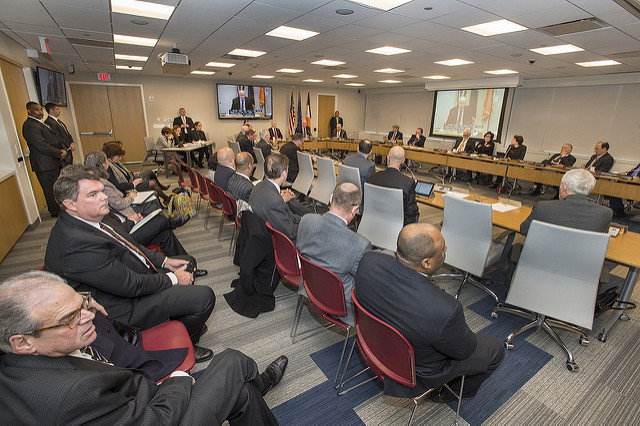In an unusual but encouraging move, today the MTA Board declined to approve a $224 million contract to renovate eight stations as part of the agency's Enhanced Station Initiative. With the mayor's appointees leading the way, Vice Chair Freddy Ferrer decided not to bring the contract up for a vote.
Advocates for accessible subway stations had urged to board to reject the contract, which did not call for adding elevators at any of the eight stations. They've been making the case that as a whole, the $1 billion Enhanced Station Initiative is a huge missed opportunity to improve access for people with disabilities.
The MTA lags far behind peer agencies in Boston and Chicago on station accessibility, with stair-free access available at just 23 percent of subway stations, according to TransitCenter's Access Denied report. The absence of ADA improvements as a standard component of the Enhanced Station Initiative is "more evidence that the MTA has no strategy or plan for achieving greater accessibility throughout the system," TransitCenter's Colin Wright testified today.
While there's often some give-and-take at MTA Board meetings, it's atypical for the actual votes to go off-script and influence the agency's plans.
But it doesn't have to be that way, and today's decision to revisit the station renovation program hints at the more muscular oversight role that the board can and should play.
In testimony today, TransitCenter advocacy director Jon Orcutt urged the board to embrace its power over procurement and construction, so the MTA delivers the capital upgrades that subway and bus riders need so badly at reasonable cost, before it's too late.
Last month, an investigation by Brian Rosenthal at the New York Times exposed the factors that have driven MTA capital costs into the stratosphere: no-work jobs on construction crews, padding projects with excessive consulting work, and uncompetitive bidding that can be gamed by contractors, to name some of the big ones.
Within New York government, there are plenty of oversight mechanisms that should have revealed this waste long ago and recommended solutions. There are auditors working for State Comptroller Thomas DiNapoli and investigative powers embedded in the State Assembly's corporations committee. But these oversight mechanisms and the public officials entrusted to use them have failed to root out construction waste that is crippling the transit system.
Through its contract approval power, the MTA Board can exert some influence to reform capital construction practices. Step one, Orcutt suggested, is for board members to simply assert their prerogative to thoroughly review large contracts before making a decision.
Here's his testimony from today's meeting:
Before there was ConEd Inflategate, there was the NY Times exposé on runaway MTA construction costs. When you approve spending for a project, it’s now an open and legitimate question how much of taxpayers and riders’ money is being spent on transit improvements and how much is devoted to the “New York premium” of unnecessary labor costs and huge mark-ups for consultants like Parsons-Brinckerhoff.
We appreciate that the board has launched a task force on procurement to recommend reforms. But with proposals for new transit funding being debated daily, and Governor Cuomo proposing congestion pricing, it’s extremely urgent that you show the public that you are making progress to ensure that MTA funds are well-used and not wasted.
Nearly every month, one of you complains about having insufficient time to review a large volume of information presented by the staff, including recommendations to approve huge contracts. Do yourself and the public a big favor today and vote yourself more time to review contract and budget documents. Require the staff to get you those materials much earlier than they do presently. You don't need the Chairman's permission. You don't need the staff's permission. Make a motion and vote on it. Act like the governing body of this organization. Be the governing body of this organization.






